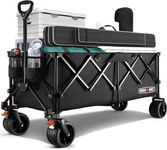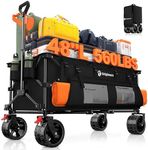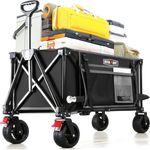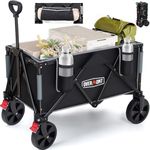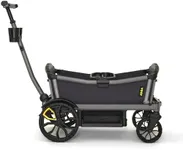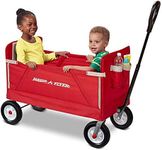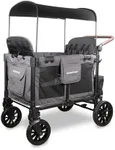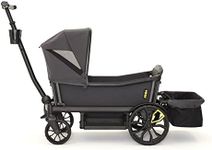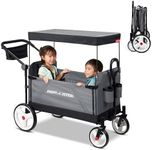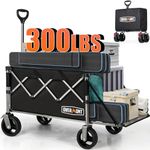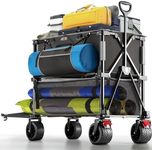Buying Guide for the Best Folding Wagons
Choosing a folding wagon can make transporting items much easier, whether you're heading to the beach, going camping, or just moving things around your garden. The key is to find a wagon that matches your needs in terms of size, durability, and ease of use. Before buying, think about what you'll be carrying most often, where you'll use the wagon, and how much space you have for storage. Understanding the main features will help you pick a wagon that fits your lifestyle and makes your tasks simpler.Weight CapacityWeight capacity tells you how much weight the wagon can safely carry. This is important because overloading a wagon can damage it or make it hard to pull. Wagons usually range from about 100 to 300 pounds in capacity. If you plan to carry heavy items like camping gear or groceries for a large family, look for a higher weight limit. For lighter loads, such as beach toys or picnic supplies, a lower capacity will be enough. Always consider what you’ll be transporting most often to choose the right weight capacity.
Size and DimensionsThe size and dimensions of a folding wagon determine how much it can hold and how easy it is to store. Larger wagons can carry more but may be harder to maneuver and store, while smaller ones are more compact but hold less. Think about the space you have in your car or home for storage, and the typical size of loads you’ll be carrying. If you need to fit the wagon in a small trunk or closet, check the folded dimensions as well.
Wheel Type and SizeWheels affect how smoothly the wagon moves over different surfaces. Larger, wider wheels are better for sand, grass, or uneven ground, while smaller wheels work well on pavement or indoors. Some wagons have all-terrain wheels for more versatility. Consider where you’ll use the wagon most—if it’s mostly for the beach or park, go for bigger, rugged wheels. For city use or smooth surfaces, smaller wheels are usually fine.
Frame MaterialThe frame material impacts the wagon’s strength and weight. Steel frames are sturdy and can handle heavier loads, but they’re heavier to lift and carry. Aluminum frames are lighter and easier to handle, but may not support as much weight. If you need to carry the wagon up stairs or lift it into a car often, a lighter frame might be better. For heavy-duty use, a steel frame is a good choice.
Fabric MaterialThe fabric used for the wagon’s body affects its durability and ease of cleaning. Polyester is common and resists water and stains, making it good for outdoor use. Some fabrics are thicker and more tear-resistant, which is helpful if you’ll be carrying sharp or heavy items. If you expect spills or dirt, look for a fabric that’s easy to wipe clean or even removable for washing.
Folding MechanismThe folding mechanism determines how easy it is to open and close the wagon. Some wagons fold flat with a single pull, while others require more steps. If you’ll be setting up and packing away the wagon often, a simple, quick-fold design will save you time and effort. Try to check how compact the wagon gets when folded, especially if you have limited storage space.
Handle DesignThe handle design affects how comfortable and easy the wagon is to pull or push. Some handles are adjustable in length, which is helpful for people of different heights. Others have ergonomic grips for comfort. If you’ll be using the wagon for long distances or over rough ground, look for a sturdy, comfortable handle that’s easy to control.
